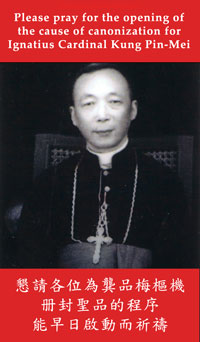The Bishop from Beijing
Rome must be Wary of China's Meddlesome Puppet Priests
by Doug Bandow
National Review
January 4, 2007
![]()
Kings, queens, and parliaments struggled with the Catholic Church over control of religious affairs for a millennium. However, once clerics' political influence was on the wane, governments gave up attempting to set ecclesiastical policy. The Church, not the state, would ever more determine theological matters.
At least, that's the way it has worked in most countries. Totalitarian states are another affair — they coexist most uneasily with organizations that claim to possess transcendent authority.
The collapse of the Soviet Union has sharply diminished the number of governments seeking to act as the religious authority of last resort, but the People's Republic of China still persists. In late December, Chinese police arrested nine priests in the underground (which is to say legitimate) Catholic Church after they had gathered to pray.
Nevertheless, Liu Bainian, vice president of the government's church, argued that "this election is legal and valid." After all, "a church cannot exist without a bishop."
Roughly 40 of 97 dioceses in China don't have bishops, yet the Church has not been derelict in its duties. The Chinese government has outlawed the genuine church and arrests its clerics and laymen alike.
That the Communist authorities selected Wang as bishop comes as no surprise. AsiaNews described him as a "person who is very timid toward the government."
Beijing denounced the Holy See for being "unreasonable" in objecting to the appointment. However, the PRC's definition of "reasonable" is a curious one. In an attempt to add legitimacy to the ordination, the communist authorities effectively abducted a couple of other bishops, holding them under guard to forcibly bring them to the ceremony. One was able to escape his captors.
Unfortunately, the latest contretemps reflects an ongoing battle between the Vatican and Beijing. In May the PRC ordained two bishops over the objections of the Catholic Church, leading Pope Benedict XVI to voice his "deep displeasure" and threaten to excommunicate the renegade clerics.
At that time, the PRC responded: "The Vatican's criticism of the Chinese Catholic churches was unfounded and disregarded history and reality." Even more bizarrely, Beijing argued that the Holy See's objection "ran against the remarks of the Vatican hoping to improve its relationship with China."
The communist government began unilaterally selecting bishops after the Catholic Church rejected a list of Party-approved nominees in 1958. Since then relations between church and state have been largely nonexistent. The PRC harasses and even jails members of the underground church: a bishop released in August had spent a decade in confinement.
In recent years the two sides have conducted an on-again/off-again dialogue to normalize relations. Even after the latest incident, Beijing's State Administration for Religious Affairs opined: "The Chinese government has a positive attitude toward improving relations with the Vatican, and we want to have a constructive dialogue on the issue of the consecration of bishops."
However, the question of PRC-Vatican relations involves more than the consecration of bishops. Also central is the status of Taiwan.
After the Communist revolution the Holy See shifted its relationship to Taiwan, which for many years claimed to be the legitimate government of all China. But in recent years the Catholic Church and Communist authorities seemed to be moving toward accommodation.
The patriotic church elevated bishops, but only ones who had been approved privately by the Vatican. Priests and parishioners were increasingly able to move among approved and underground Catholic churches.
After the death of Pope John Paul II there was speculation that the Catholic Church might be willing to shift its recognition to Beijing in return for normalizing the church's status on the mainland. Earlier this year negotiations were moving forward, until the PRC elevated the two unapproved bishops. At that point a modus vivendi retreated from view.
Obviously, the Catholic Church has an interest in winning legal status in China. That would benefit both the church as an institution as well as an estimated eight million underground believers.
However, the Vatican must be wary of yielding on bedrock issues. First, it must not accede to Beijing's main goal, which has always had been dominance.
After the Holy See criticized the latest unauthorized ordination, a government spokesman said "We hope the Vatican will stop interfering into China's internal affairs." That is, the Communist government believes church governance to be a political issue subject to Beijing's control.
Thus, the Catholic Church might find it difficult to win a guarantee for genuine independence. Yet it would hardly be worth dickering over anything less.
Second, Taiwan should not be sacrificed lightly. Although the Vatican's role is not (or, at least, should not be) primarily political, the Catholic Church's relationship with the Republic of China has long affirmed the latter's independent existence in the face of the PRC's determination to swallow the small island state.
Obviously, Taiwan's status is not a theological matter. However, since human rights, including religious liberty, are respected there but not on the mainland, the Vatican can and should seek to bolster Taiwan's status. Given the growing cultural and economic relations between the two Chinas, over the long-term a free Taiwan is likely to make for a freer PRC.
The mainland has come far over the last couple of decades. But the PRC still lags when it comes to respect for human rights, including religious freedom. Can negotiations with the religious body change that?
After the Vatican criticized the Chinese government for its latest attempted hijacking of the Catholic Church, Beijing opined: "If the Vatican really cares about the cause of China's Catholic churches, there should, naturally, be understanding and support" from the Vatican for the government's actions. But if the Communist authorities actually cared for their people, they would leave the choice of bishops to the Catholic Church. Alas, there is no evidence that the communist government cares about the Chinese people, especially their right to believe and worship as they see fit.
The Holy See has good reason to continue talking to the PRC. But the former also has good reason to be cautious about the risk of sacrificing fundamental interests for superficial gains. Until the Communist authorities demonstrate their willingness to accept freedom of conscience and worship, there won't be much for Beijing and the Vatican to discuss.

Doug Bandow is a vice president of policy for Citizen Outreach and the author of several books, including Foreign Follies: American's New Global Empire (Xulou Press). He is working on a book on international religious persecution.




